As the chancellor stood outside Downing Street to deliver the Autumn Statement, leaders and innovators from across pharma and healthcare gathered at London Tower Bridge to discuss the future of the sector at the 11th annual Pharma Integrates event.

With nurses voting to strike, cancer waiting lists at an all-time high, and a cost-of-living crisis, the NHS is at crisis point. But armed with an innovative and ambitious pharma & healthcare sector that saw us through the unprecedented COVID-19 pandemic, we have the tools, skills, and visions to reform health in the UK and globally. As the flagship event of Life Science Integrates’ busy conference calendar, Pharma Integrates saw the brightest minds from industry, academia, policy, charity, and the NHS gather to discuss the biggest issues of today. With keynote talks, exclusive interviews, 13 panel sessions, product exhibitions, and a wealth of networking opportunities, the day focused on the core themes of big health challenges, new technologies, and industry enablers.
Continuing a long-established partnership with The Association of the British Pharmaceutical Industry (ABPI), Pharma Integrates 2022 was opened by Susan Rienow, ABPI Vice President and UK President of Pfizer. Susan looked to 3 years ago when the WHO was informed of a cluster of cases of a pneumonia-like illnesses in China: “just as our industry was central to tackling the pandemic, we’re central to tackling the challenges we face today”. Speaking on the day of the UK’s Autumn Statement, Susan alluded to the government’s ambition to make the UK a science and pharma super-power, celebrating the fact that “life science contributes £37 billion a year to UK GDP, providing over 580,000 jobs.” Balancing the challenges faced by the NHS with the opportunity of new medicines and vaccines in the pipeline, Susan ended with a message of hope: “there’s huge potential for our sector to both transform the UK economy and transform lives of patients.”
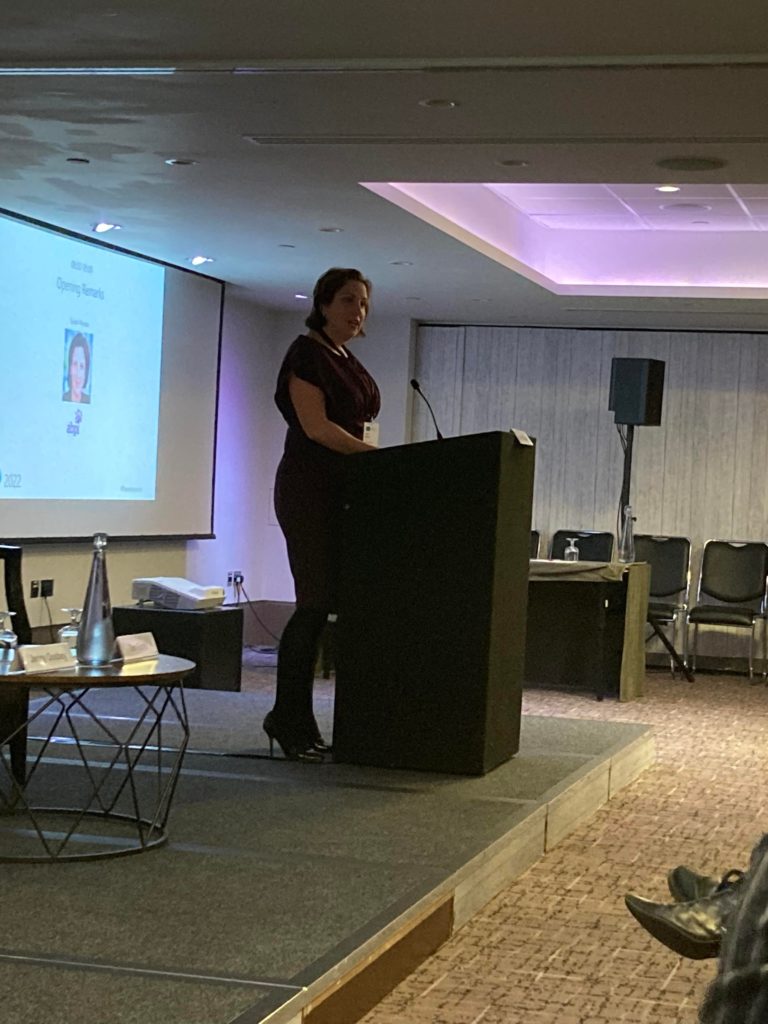
“There are 1.2 million eligible patients potentially missing out on medicines.”
Addressing the increasing pressure on the NHS, Tim Ferris (National Director of Transformation, NHS England and NHS Improvement) took to the stage for a fireside chat with Jenny Ousbey (Ovid Health). “We all share the same desire to bring the most effective treatments to patients as fast as possible, but the mechanisms are challenging in such a complex system,” Tim opened. He emphasised the importance of partnership between industry and the NHS to start closing gaps, with a focus on cardiovascular disease, cancer, and mental health. “The NHS doesn’t learn enough from the NHS,” he pointed out, explaining that there are some places where the NHS is working remarkably well, and some where it isn’t. Tim ended with a contemplation from his morning commute: “I was looking at the ads on the tubes – ‘we use a single platform and that makes everything go faster’ – that’s what we need for the NHS.”
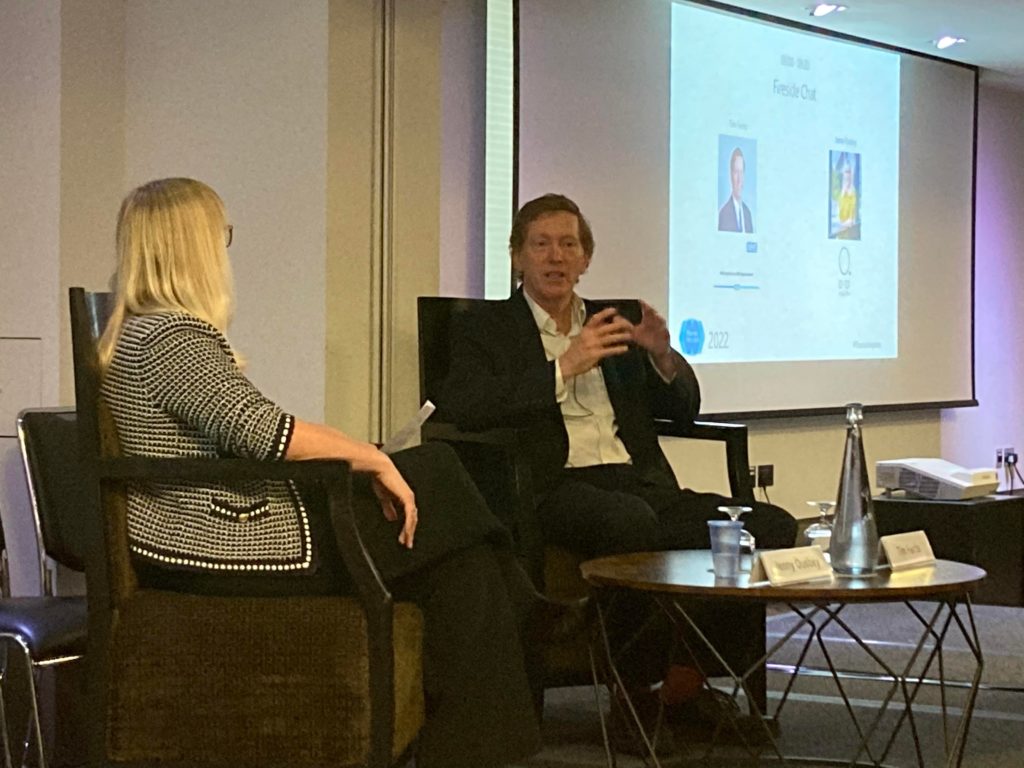
“Since 2008, the NHS budget has been growing by ~1% but demand has been growing by 4%”
Sharing his experienced perspective on the NHS, Lord David Prior (former Parliamentary Under Secretary of State for Health and the Department of Business, Energy & Industrial Strategy, former Chairman of NHS England, and current Deputy Chairman UK & Global Senior Advisor at Lazard) joined Tamsin Berry (AreteiaTx, Population Health Partners) for a second fireside chat. “The NHS is a sick system in two senses – it cares for people who are already sick, and it’s a failing system,” he claimed, outlining the issues of a budget skewed towards acute care, squeezing capacity for primary care, prevention, and public health education. “The NHS is the least resilient system in Europe today,” stated David, explaining that the issue isn’t due to a lack of trying to reform: “we’ve tried everything to improve the NHS, but this highly top-down, politically driven, hierarchical system has been tested in almost to destruction.” Looking to solutions, he alluded to the potentials of integrated care systems and precision public health, where risks are identified early, the mechanisms are in place to deal with them, and the necessary pharmaceuticals are affordable.
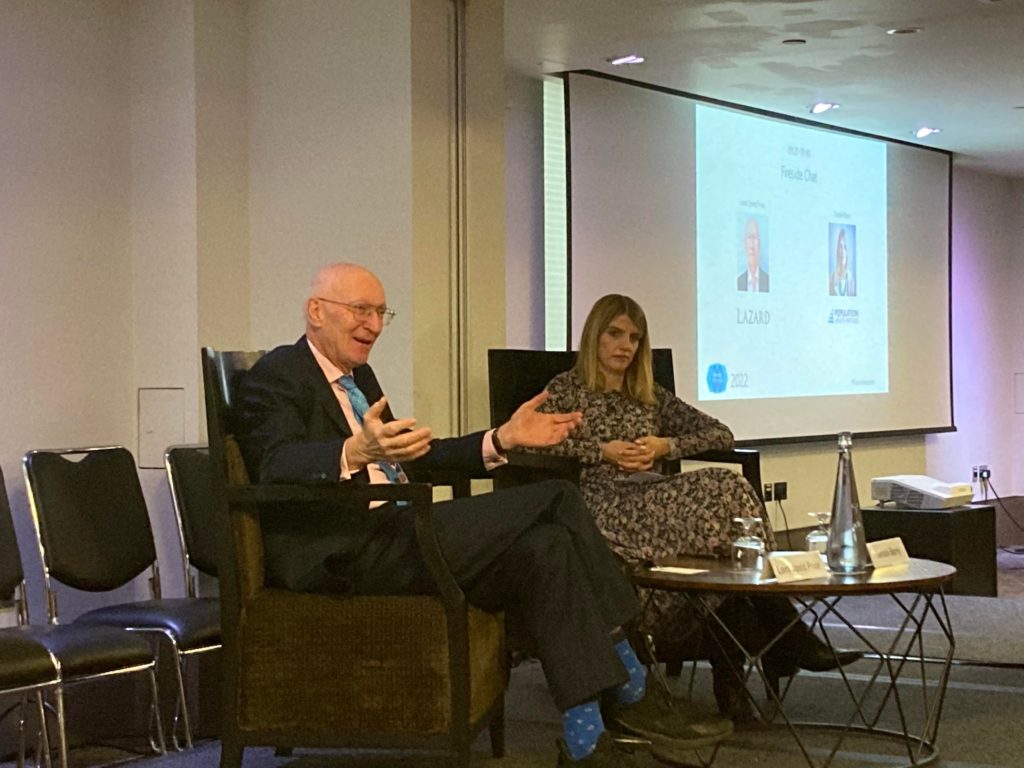
Big Health
Despite significant progress in the treatment of many conditions, there remain some disease areas with a large unmet clinical need, and the Big Health track covered aging, respiratory disease, rare disease, and cancer.
“We need to build diagnostic capacity alongside the treatments of tomorrow. One day, we hope there’ll be a statin for the brain”
Facilitated by Lord James O’Shaughnessy (Newmarket Strategy), the ‘Rise of the centurions’ session asked what increased longevity and age-related diseases mean for the pharmaceutical industry. “The global population this week passed 8 million,” began Nick Stephens (The RSA Group). He called for a focus not on lifespan but health span – “we have people who are living unhealthy lives from 70-90 and that’s going to grow to 70-100 or even 110.” Giovanna Mallucci (Altos Labs) drew attention to the hidden pandemic of dementia. “In over 70s there’s a 1 in 3 chance of dementia, which increases to 1 in 2 for over 80s,” she began. “You can’t cure dementia. But you CAN slow it. I’m absolutely sure we can impact the course of the disease,” she stated, calling for funding not just from the government and charities, but from billionaires, VCs, and people looking to take care of their future health. Tina Woods (Collider Health) called for a paradigm shift towards a preventative model, outlining the need to link biological, psychological, and behavioural aspects of aging for a whole life approach. “People are seeing clinicians when they’re already experiencing symptoms, but the changes in the brain are happening up to 15 years before,” said Samantha Benham-Hermetz (Alzheimer’s Research UK), explaining the need to build diagnostic capacity alongside treatment.
“3 people die a day in UK from asthma, but 2/3 of these deaths are preventable”
Tackling the large gap in our current asthma treatment model, the ‘Take a breather’ session was facilitated by Tamsin Berry (AreteiaTx, Population Health Partners) who began with the sobering statistics that even though asthma costs the NHS £1.1 billion a year, 60% of asthmatics are not receiving the care they need. Driving home the scale of the problem, Sarah Woolnough (Asthma + Lung UK) opened by stating that “by the time I’ve made my points, almost 20 people will have had asthma attacks in the UK. By the time all the panellists have also made their points, someone will have died of a lung condition.” She called for more investment into research and innovation, and increased public and private collaboration which has delivered successes such as the blue inhaler. “It’s really important to continue to invest in public-private partnerships that will improve access,” agreed Jorge Bartolome (Areteia Therapeutics), who spoke of the poor penetration in the UK of life-changing biologic therapies: “it takes 4 exacerbations to be able to access a biologic therapy. This needs to change.” This was reinforced by Salman Siddiqui (NHLI, Imperial College), who also called for digital tools for diagnosis and e-monitoring to improve inhaler use. “Better diagnosis, early intervention, and better management of patients will really transform how we see healthcare in the future,” concluded Andrew Roddam (Our Future Health).
“1 in 17 of us will have a rare disease at some point – they’re individually rare, but collectively common”
With exponential advancements in breakthrough therapies for rare diseases over the past decades, Jo Pisani (The RSA Group) asked how we can improve patient access in the ‘Dare to think rare’ session. All panellists agreed that early diagnosis is crucial to saving lives. “In the case of spinal muscular atrophy, you can’t wait for symptoms. It’s crucial to get medicines into patients at the earliest possible time – every second counts,” said Portia Thorman (Spinal Muscular Atrophy UK), explaining how new-born screening could save the UK £67 million per child. Speakers praised the technological advances in diagnosis and treatment, but acknowledged accessibility challenges. “We need strategic alignment across healthcare systems to allow patients to truly benefit from technological advances,” stated Imran Kausar (Novartis), mentioning how bureaucracy and process inhibits progress in the UK. Improving access requires effective communication with those in control of budgets: “benefits to patients, savings for healthcare systems, savings for education systems – we need to communicate these to the government,” explained Roudie Shafie (OVID Health). Looking to the future, speakers discussed the possibility of in utero screening and treatment, and the excitement around advanced therapies. “We’ve got 30 ATMPs coming through for assessment in next few years. We’ve got momentum and collaboration – now it’s time to take action,” said Finn Willingham (Cell and Gene Therapy Catapult).
“Only patients that are living with cancer can tell you what it means”
With record delays making news headlines, cancer was the focus of ‘The big ‘C’’ session. Facilitator Linda Summerton (tranScrip) led the panel through the pathway of cancer treatment, from early diagnosis to prevention to living with cancer to personalised treatments. “Yes, we’ve improved early diagnosis in some areas – there’s been success in cervical, breast and prostate cancer screening programmes, but on the whole, many cancers are still diagnosed at a late stage,” explained Jane Robertson (Redx Pharma). Renata Crome (PTEN Research Foundation) also shared mixed views on the state of early diagnosis – “we have more investment in research, more user-friendly tests, multi-cancer detection tests, but there are also harms and risks of early detection -mental health, anxiety, trauma from multiple biopsies.” Giving a patient perspective, Emma Kinloch (Salivary Gland Cancer UK) explained the issue that “lots of screening programmes rely on people taking part, and there are inequalities in access and willingness.” “Marginalised groups are less likely to pursue care or even trust physicians, so are more likely to experience severe outcomes – we need to address this,” agreed Jason Mellad (Start Codon), advocating for care pathways. On prevention and treatment, the panel agreed that we don’t currently have a true antimetastatic drug, but as patients live longer with cancer, we need to ensure quality of life is maintained. Marcel Gehrung (Cyted) introduced the concept of the ‘rectangularisation of life’ – making sure quality of life is kept very high for as long as possible until it drops off right at the end. “Only patients that are living with cancer can tell you what it means to live with cancer,” emphasised Emma, “I have 3 letters for you: PRO – patient reported outcomes. They’re used in late-stage trials, but we need to use them in early-stage trials and dosage management.” The panel ended with discussion of personalised medicines: “does it work in the real world? Yes and no,” stated Renata. “It’s not even on the agenda on poorer countries, and even in richer countries it isn’t effective equally because of genetic variation in ethnic groups. We need diverse, representative clinical trials, and the UK is perfectly positioned for these studies.”
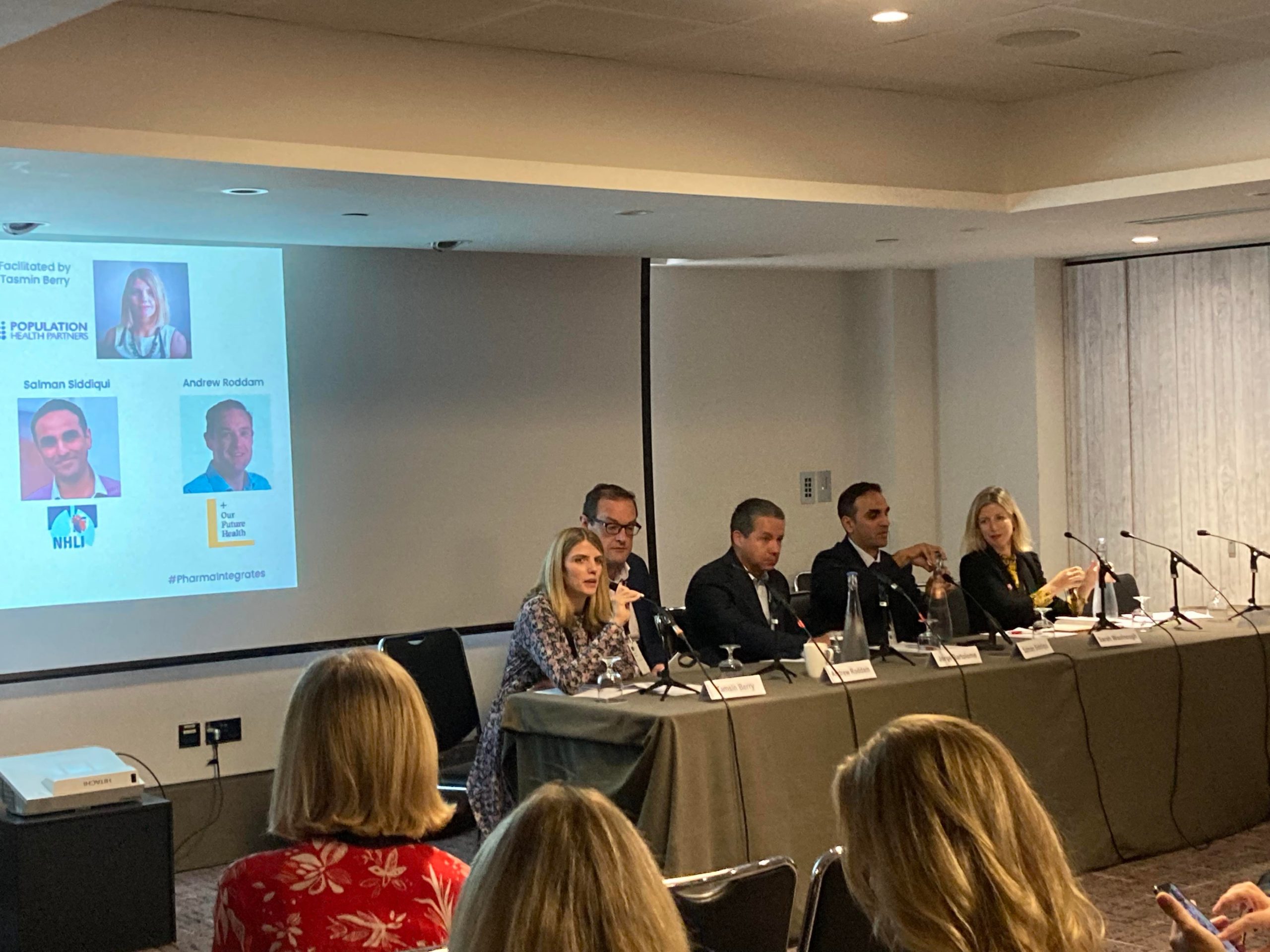
Technology
Rapid advances in technology open huge potentials for healthcare. The Technology track asked how we can use technology to improve health outcomes, supply chains, and sustainability.
“Always keep the end goal in mind”
Accelerating formulation is key to speeding up time to market, and this was covered in the ‘Formulating the future’ session led by Maureen Wedderburn (MMIC). Discussing the new tools and technologies available to aid with candidate selection, Anke Domdey (Nanoform) noted that “we’re losing time when people take a traditional, academic step-by-step approach without keeping the end in mind. It’s crucial to ensure studies are designed to answer the right questions, right from the start.” David O’Connell (PCI Pharma Services) agreed, commenting on the benefits of multi-skilled teams who are all focused on one united end goal. Christopher Morton (ELEM Biotech) discussed the ability of virtual clinical trials to accelerate time to market, explaining his innovative software for performing medical trials by modelling humans on supercomputers. Turning to sustainability, Dolly Jacob (Quotient Sciences) called for us to think about whether and how drugs can be repurposed throughout the development process. “For a product or company to be successful, it needs to be scalable, sustainable and sellable,” concluded Claire Thompson (Agility Life Sciences).
“How much do we value our future planet vs the current health of our population?”
As COP27 drew to a close, sustainability was the focus of the ‘Go green!’ session, led by Christophe Le Ret (Umicore). The panel acknowledged the big changes being made to reduce environmental impact, but called for greater collaboration and innovation in order to reach targets. “When there’s a real driver for change people come together, the question is, will this be fast enough?” challenged Christian Jones (Nanoform). Robert Williams (AstraZeneca) explained the need for supply chain engagement and collaboration: “supply chains overlap, so pharma companies need to coordinate with each other to set consistent requirements of supply chains.” And this coordination needs not only to occur within the UK, but internationally: “we need consistent measurement and goals across different companies and countries,” stated Mark Cassidy (Ajinomoto Bio-Pharma Services Europe). However, sustainability isn’t cost free, and the panel discussed the need to demonstrate value. “More disruptive technologies will be needed for more efficient, greener processes. These will have a cost associated,” explained Roland Brown (Pfizer). The speakers shared optimism over the opportunity for digital innovation to improve processes and sustainability, but large challenges remain. “We have to be realistic about what is achievable and factor this into goals,” advised Jen Baxter (Protium Wales).
“Educate regulators, NICE, NHS England, in what digital therapeutics were, could be, and how they need to be assessing them”
Innovations around COVID-19 changed the MedTech landscape, and the future MedTech was discussed in the ‘Detect Inspect Healthtech’ session, facilitated by Phil Carvil (UKRI Science and Technology Facilities Council). “Demand for home testing devices has risen significantly through COVID-19. People are more engaged in their health,” explained Neil Tween (Owlstone Medical), calling for device development pathways and supply chains to adapt to make devices suitable for home use. John Drakenberg (Alex Therapeutics), agreed on the pandemic-driven acceleration of digital technology, and shared advice on improving patient engagement: “if you ask something from patients, you have to give twice as much back in terms of insights and health benefits.” Rahul Kapoor (CPI) commented on the potential of digital technology to improve manufacturing and supply chains, enhancing connection and communication. The session closed with panellists sharing their hopes for the future. “In 10 years, we can’t imagine accessing healthcare as we do, something’s going to change, and that change is likely to be digital,” said Charlotte Lee-Sinclair (Third Culture Ventures), calling for anyone with an interest in digital therapeutics to connect, collaborate, and partner.
“NOT digitising supply chains has a direct negative impact on community well-being and an indirect impact on the cost of looking after communities”
Consumers, treatments, and health systems are changing, and the ‘Signed sealed delivered’ session, led by Miles Newman (Atos), addressed how supply chains can keep pace. Lee Fosbrook (Atos Consulting) outlined some of the exciting digital trends: “there’s increasing investment in technology and data to build real-time visibility of what’s physically happening in supply chains, and to build predictive models to anticipate disruption.” However, implementation is slow. “Healthcare supply chains are about 20 years behind other sectors,” commented Jagjit Singh Srai (University of Cambridge), “but I’m optimistic because the highest number of digital lighthouses are in healthcare, meaning there’s a huge gap between the art of possible and our current practices.” Stefan Kulik explained how Royal Mail Health is working to adapt supply chains to changing demands: “supply chains were built to get drugs to retail, but that’s not the situation now. We want to find ways to get to medicines to patients earlier and faster, to enable prevention rather than just treatment.” Santosh Sahu (Charac) agreed in the need for supply chains to adapt, stating that “the lack of digitisation in the supply chain directly impacts the patient”, and explained how partnership between corporates and start-ups could accelerate innovation in this area.
“AI is not meeting expectations because expectations are unbelievably high.”
AI is being applied to drug discovery, development, diagnosis, and supply chains, and the ‘Artificial Intelligence – hype, hope or happening?’ session covered the current use and future potentials of AI, led by Ele Harwich (Newmarket Strategy). Beth Fordham (White Swan) discussed the opportunities of natural language processing in analysing recordings of patients talking about their disease and treatment experiences. Ajay Mistry (Oppilotech) outlined the exciting opportunities of AI in drug discovery, “deconvoluting the complexity of biology” and aiding in the development of small molecules that will actually bind to the target. “AI kicks in where a wet-lab or individuals can’t do something today,” said Raminderpal Singh (Incubate.bio Ltd), sharing a biotech perspective. Steve Gardner (PrecisionLife Ltd) explored the potential of AI in healthcare settings, helping to put nursing staff in the right place at the right time, and in optimising appointments. However, uptake remains slow, and the speakers discussed the factors slowing down adoption, including the burden of data cleaning and the need to build patient trust. To conclude, the panel shared their hope for future policy: “having worked in policy making, it’s very reactive rather than proactive,” stated Jessica Morley (Bennett Institute for Applied Data Science, University of Oxford), “more concrete policy action is needed.”
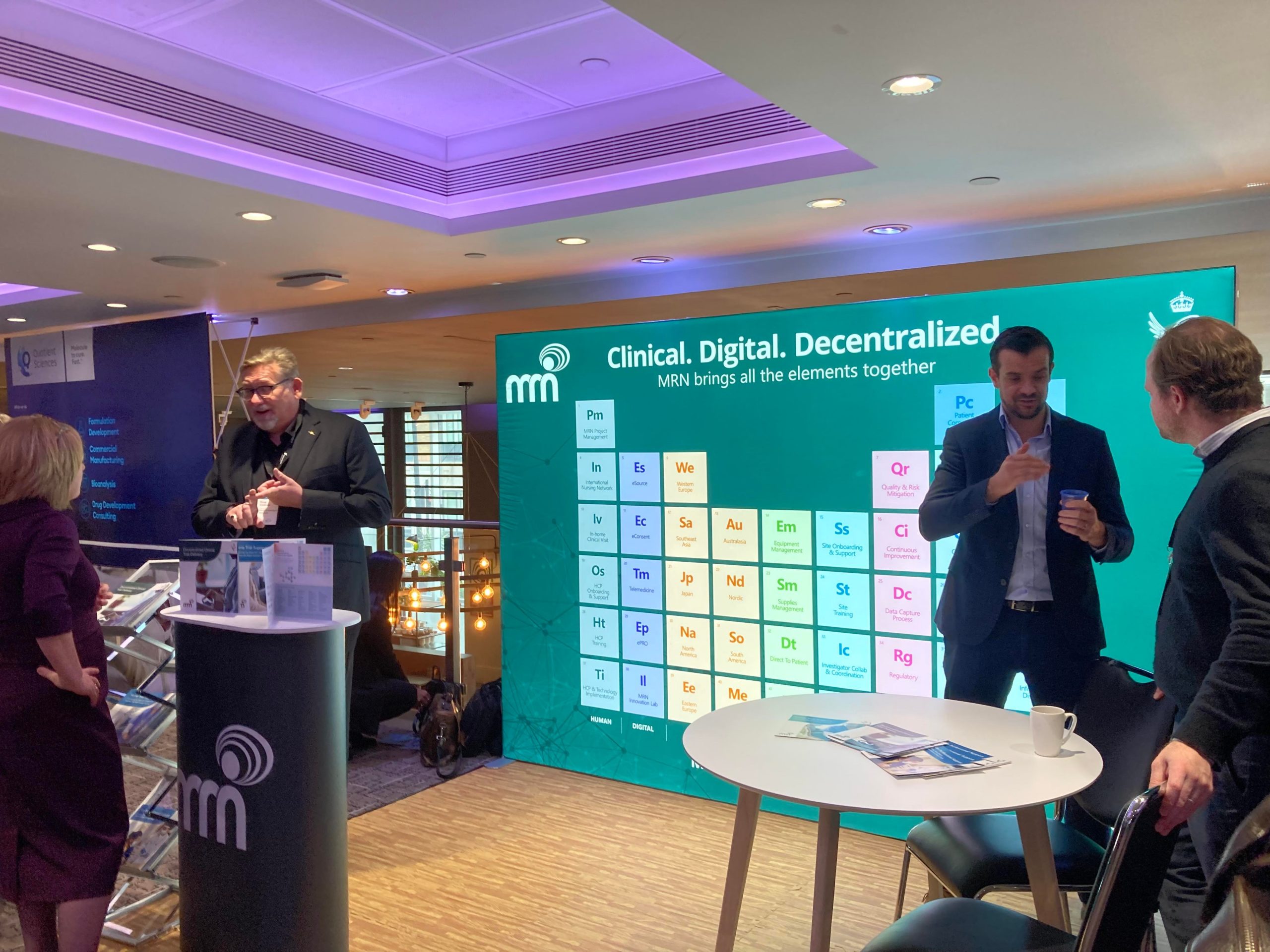
Enablers
Diverse skilled teams, empowered patient, and efficient navigation of the economic and regulatory environments can enable a better Industry, and these themes were the focus of the Enablers track.
“Be open about what you’re trying to achieve. Collaborate and participate with patients”
Treatments are ultimately about the patients, and patient engagement was the focus of the ‘Patients in charge’ session led by Jenny Ousbey (Ovid Health). Panellists agreed that healthcare is not just about creating technologies or treatments, but about engaging with patients to demonstrate the advantages of these developments. “Involve patients early and keep them keen,” said Nigel Brokenshire (Bayer PLC), advocating for co-design, co-production, and partnership. Discussing the challenges to be overcome, Helen Quinn (NIHR PRC: Exeter) pointed out the flaws in the NHS e-patient records, and Tim Ringrose (Cognitant) mentioned the information paradox: “there’s so much information and miss-information on the internet, and we need to communicate how to find the right information you can trust.” Discussing technology, Helen noted the importance of digital innovation, but highlighted issues of digital poverty and access. Looking to the next 5 years, Peter Bannister (University of Birmingham Centre for Regulatory Science and Innovation) spoke of building trust: “you need to build the trust that you’ll use the data in a way that brings patients tangible benefits.”
“The life sciences industry needs to represent the communities we’re working for”
With male chairs and non-exec directors still earning on average 107% more than females, the ‘Vive le difference’ session focused on improving diversity and inclusion, led by Kathryn Simpson (Kathryn Simpson Consulting Limited). “It matters that people see someone that looks like them in the room,” told Amina Udechuku (Takeda UK), talking of the importance of representation. “It’s useful to think of diversity, equity, and inclusion like a race – are we all starting from the same point? And when we start, are we all facing the same obstacles?” Emphasising the importance of diversity of thought, Sally Moore (Top Stream Coaching and Consulting) commented that “we live in a minds economy, we need the best minds and the brightest ideas, those minds might not work like everyone else’s.” All speakers agreed that diversity must be embedded into the fabric of an organisation: “embed D&I in your corporate goals. HR and Communications leads need to be fully involved,” said Melissa Hanna-Brown (Pfizer). The session finished with reflection on the joy brought by true diversity. “Diversity is being invited to the party; inclusion is being invited to dance. How you dance depends on the music (the organisation’s culture)” said Michael George (Labcorp).
“Trust takes a long time to build and can be destroyed quickly. The challenge is maintaining that trust”
Led by James Fry (Mills & Reeve), the ‘Are you in or out-sourcing?’ session discussed the role of CDMOs and CROs. Catherine Blackman (GSK), commented on how out-sourcing decisions depend on the stage in the product life cycle: “when we’re launching a product, we need absolute flexibility. But in growth stage, there are different things to consider such as cost and efficiency.” Sharing the perspective of a smaller biotech, Jason Cameron (Orphan Drug Consulting) agreed on the importance of capacity and speed, and spoke of what makes a strong partnership: “a strong partnership is when you’ve had a relationship before, you’re confident that the way of working fits, and your cultures and visions align.” Steve Barr (SK biotek), Steven Facer (Adare Pharma Solutions) shared the CDMO point of view. “We can be as flexible and agile as anyone wants but it’s not costless – it’s that tension between flexibility, agility and cost,” commented Steve Barr. Steve Facer spoke of the importance the clear alignment of objectives: “you need a good contract. Really agree what your true expectations of each other are.”
“We need to persuade this risk averse industry to do things differently and capitalise on opportunity”
The pandemic forced clinical trials to adopt a decentralised model, but will this remain? This was the focus of the ‘Trials and tribulations’ session, facilitated by Stuart Redding (MRN). “Post-pandemic, clinicians are moving back to traditional ways of performing clinical trials, but the public are more expectant of things being done virtually, making recruitment difficult,” explained Helen Shaw (The VCTC). James Chennells (Bayer) mentioned the challenge of trial site burden: “the number and complexity of trials has increased but staff numbers have dropped, leading to a perfect storm when it comes to capacity,” he observed, explaining how decentralised and virtual trials could help to lower this burden. But changing processes and assumptions in a long-established industry is difficult, commented Michael Young (Lindus Health). Stephen Gunnigle (Synetic Life Sciences) agreed, explaining that you can’t retrofit a protocol – decentralised models need to be built into the protocol from the start. Explaining his novel tool of ‘virtual patient populations’ on which to conduct clinical trials, Christopher Morton (ELEM Biotech) demonstrated the exciting opportunities on the horizon, but advocated for a mixed model approach of virtual tools, decentralised trials, and traditional approaches. “Don’t replace one approach with another, one extreme is just as bad as another, mix the tools we have today to get the best outcome,” he advised.
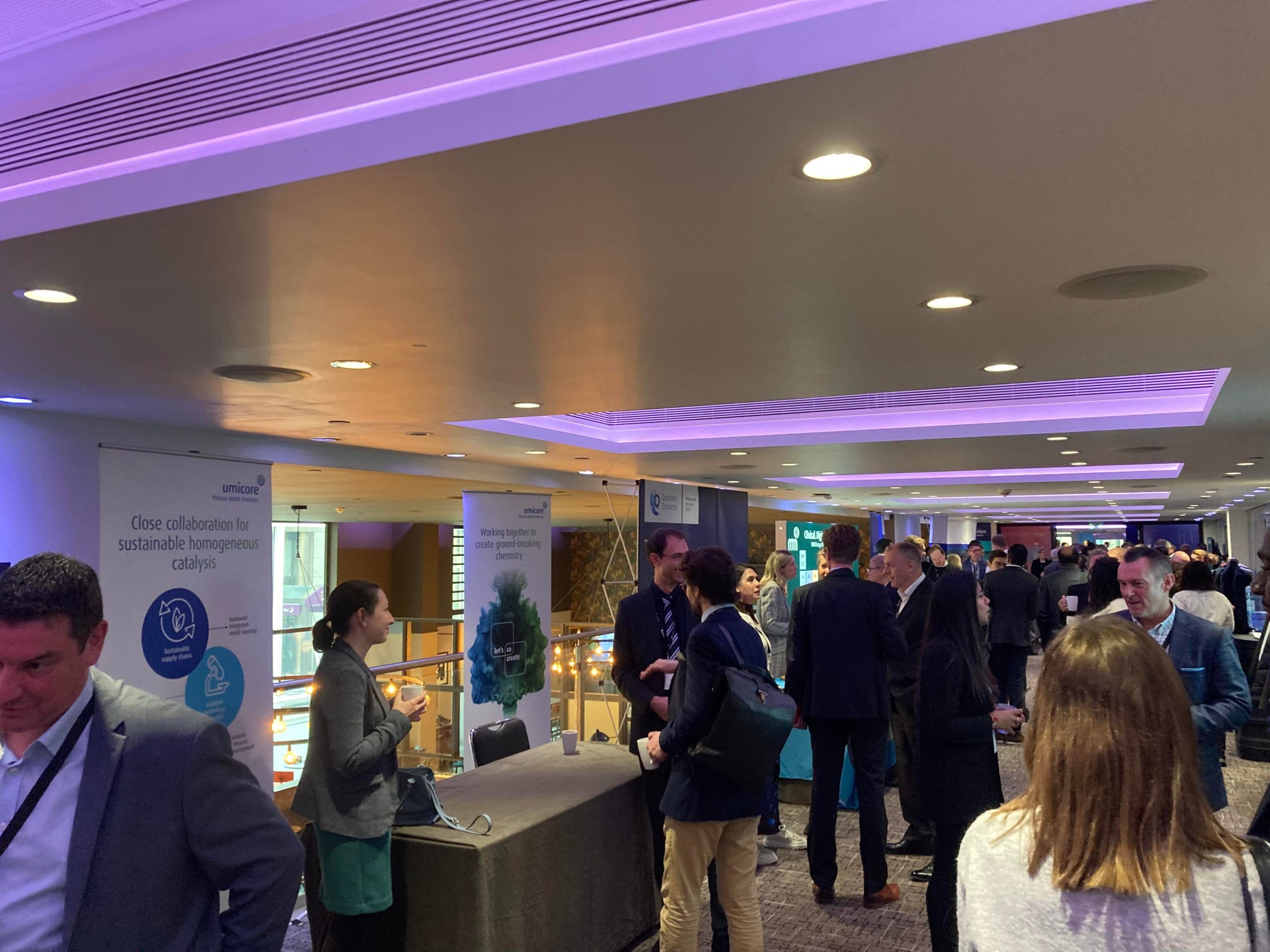
“The flagship event of our busiest year yet”
With well-received closing remarks from Trevor Jones (Chairman, e-Therapeutics and Board Member, Respiratory Innovation Wales and Ascension Healthcare), all delegates ended the day with an informal and high-spirited networking session, re-kindling old relationships and sowing the seeds for new partnerships that will hopefully lead to future collaborations. “As the 11th annual Pharma Integrates, it’s incredible to reflect on how far the industry has come, and I’m excited to see the growth of all the novel innovations spoken about today,” said Samuel Thangiah, LSI Executive Director. “Pharma Integrates was the finale of our busiest year yet, with seven events addressing all areas of the sector,” commented LSI Executive Director Christopher Watt. “We’d like to thank all speakers, partners, sponsors, and delegates who have supported us this year, and we look forward to seeing you next year.”
All recordings of the sessions can be found online, and keep your eyes open for 2023 event dates.

